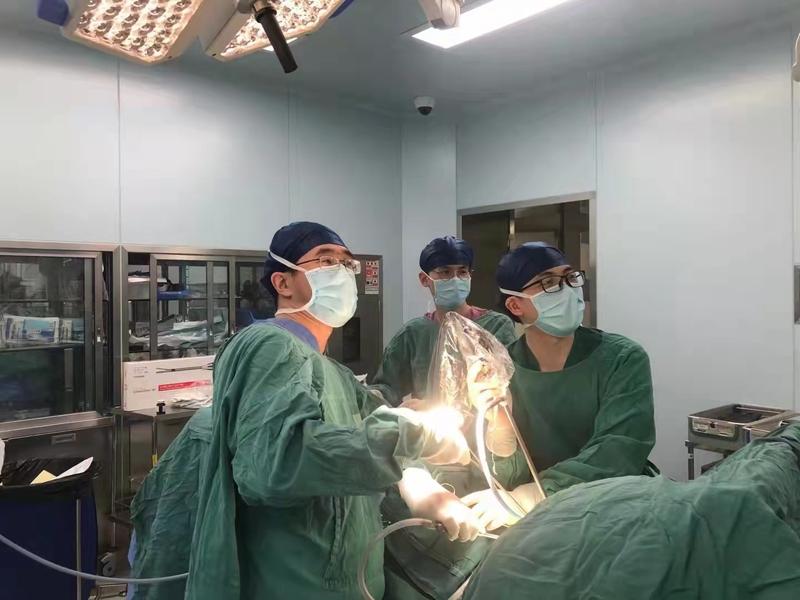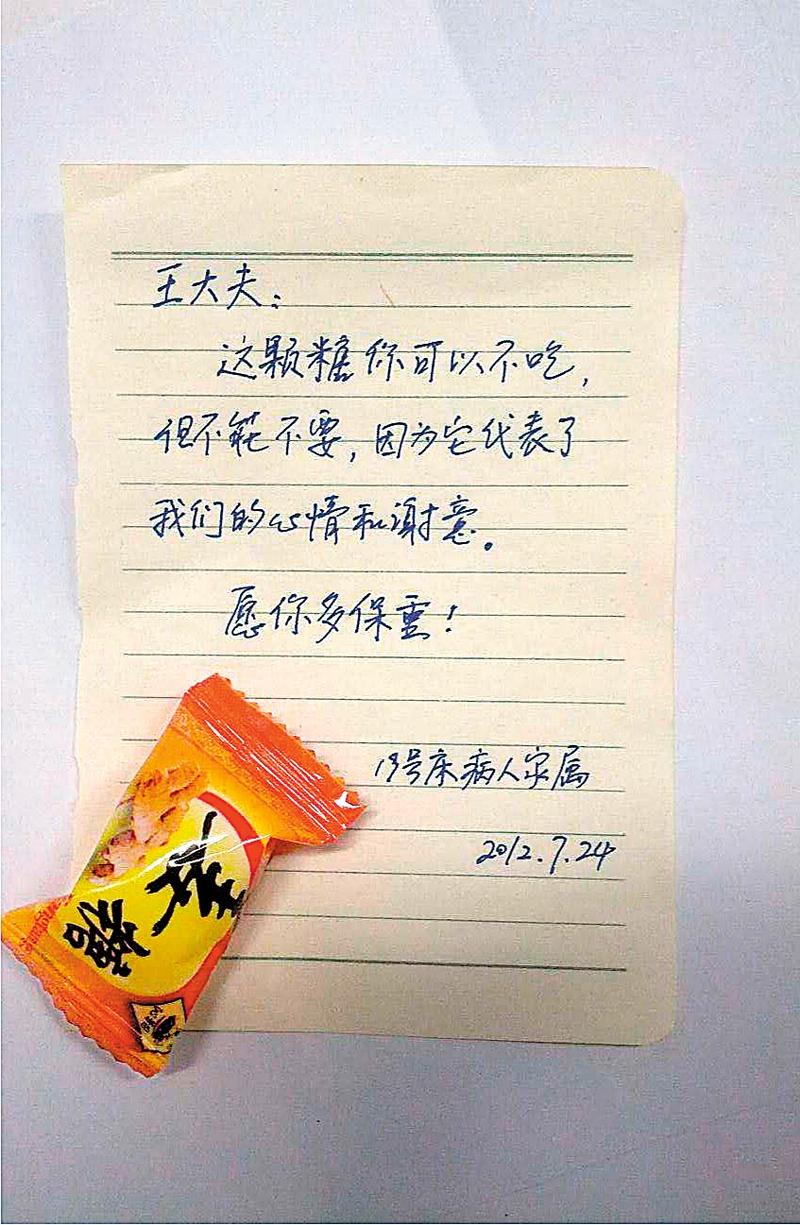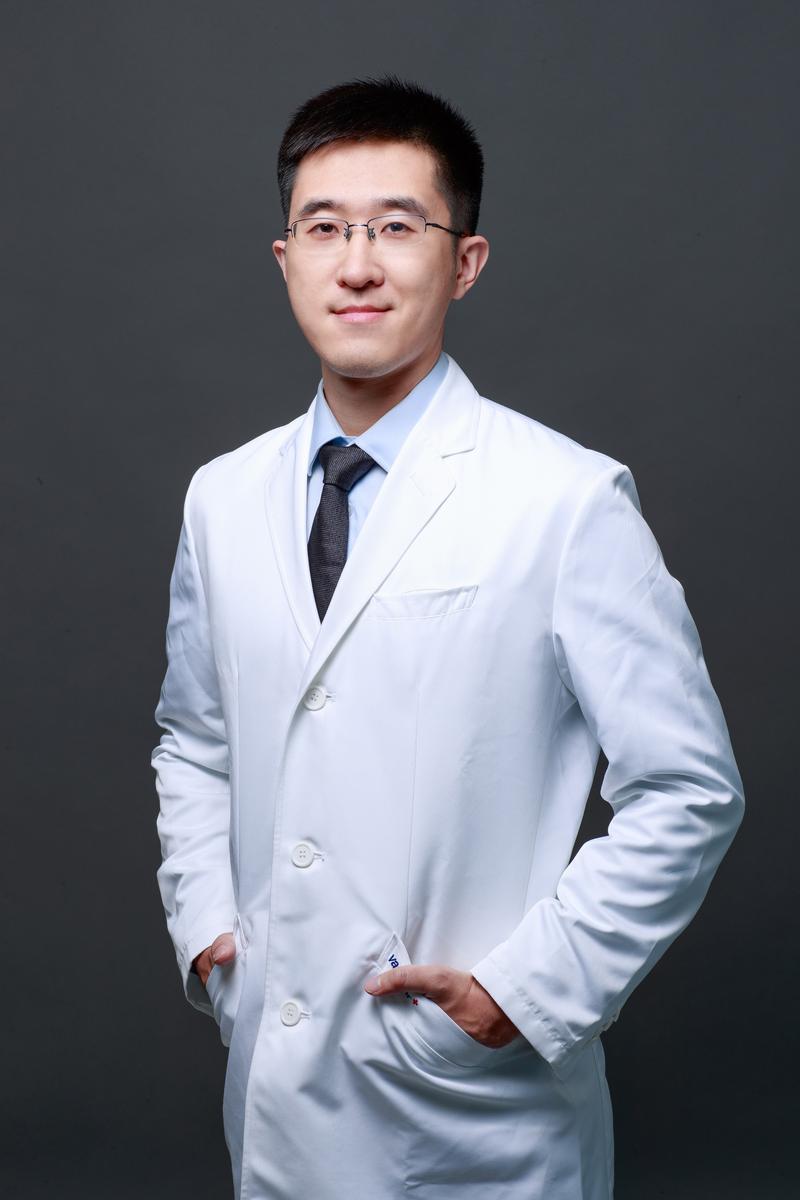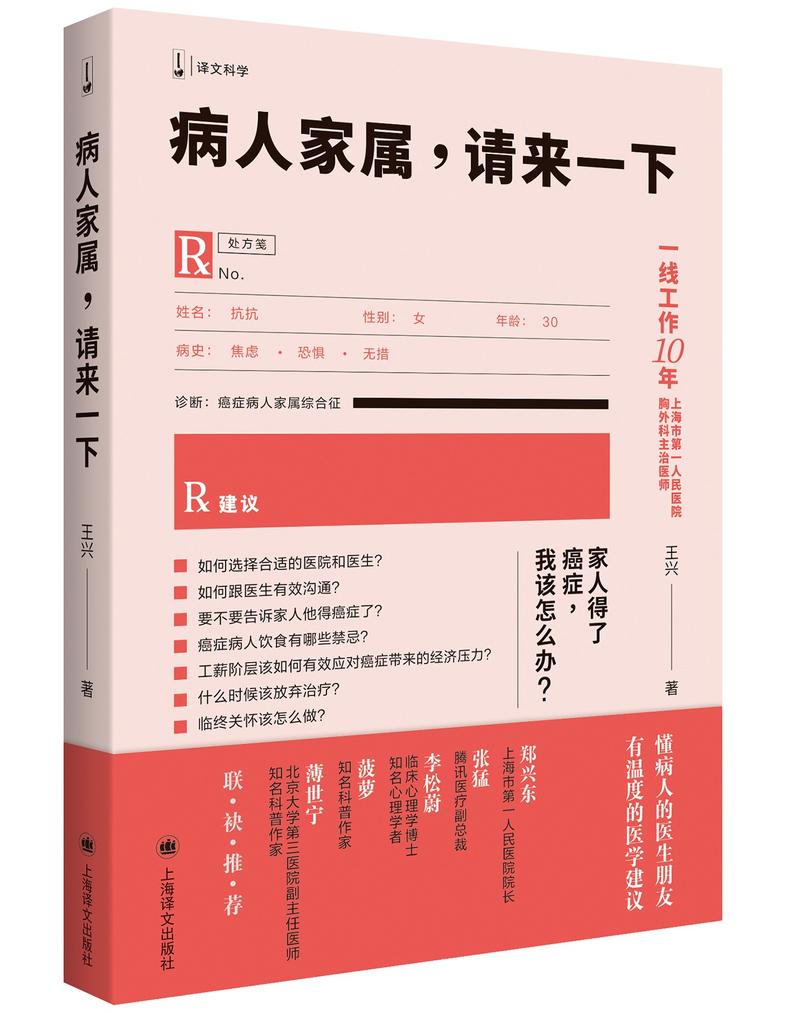Doctor seeks to help families with practical advice when dealing with the trauma of cancer, Fang Aiqing reports.
 Shanghai-based surgeon Wang Xing (left) operates at Shanghai General Hospital. (PHOTO PROVIDED TO CHINA DAILY)
Shanghai-based surgeon Wang Xing (left) operates at Shanghai General Hospital. (PHOTO PROVIDED TO CHINA DAILY)
As a thoracic surgeon and a relative of a gastric cancer patient, Wang Xing's latest book, Bingren Jiashu, Qing Laiyixia (Excuse Me, the Doctor Would Like a Word), aims to help a patient's nearest and dearest during what is a very difficult time.
Wang gives tips in the book on how to choose a suitable hospital and doctors, how to identify reliable information, make treatment choices and take care of cancer patients, as well as offering advice on physical examinations, purchase of commercial insurance and other precautionary measures.
One area where the (new) book touches me the most is that the doctor puts himself in the position of the patient’s family and helps them make the optimal choice.
Zheng Xingdong, head of Shanghai General Hospital
Over the past decade, Wang, born in 1988, has been writing for multiple online platforms and going on TV shows to popularize knowledge about lung cancer and medical treatment.
Previous best-sellers of his include How to Diet as a Cancer Patient?, which he wrote with his doctoral mentor Yang Yue. He also published a novel of workplace anecdotes set in a fictional hospital under the pseudonym of langyisheng, or Dr Wolf, which will be adapted into a TV series.
"One area where the (new) book touches me the most is that the doctor puts himself in the position of the patient's family and helps them make the optimal choice," Zheng Xingdong wrote in the preface to the book. Zheng is head of Shanghai General Hospital, where Wang works.
Statistics from the International Agency for Research on Cancer attached to the World Health Organization suggest that, in 2020, China had 4.57 million new cases and 3 million cancer deaths, with an incidence rate indicating that one in five people is likely to develop cancer before the age of 75.
 A photo in the book, Excuse Me, the Doctor Would Like a Word, shows a candy and a note of appreciation from an 83-year-old patient of Wang's. (PHOTO PROVIDED TO CHINA DAILY)
A photo in the book, Excuse Me, the Doctor Would Like a Word, shows a candy and a note of appreciation from an 83-year-old patient of Wang's. (PHOTO PROVIDED TO CHINA DAILY)
In China, having a cancer patient at home can be a major challenge, emotionally and financially, for the whole family.
Taking care of a cancer patient usually requires an intense amount of time and physical output to provide company and care, as well as constant family decision-making to balance treatment and finances. It also involves long-term fear and frustration, and stress in comforting the patient while maintaining life and work, not to mention interpersonal relationships that can often make things even more complicated.
These families are frequently struggling with the huge disparity in medical resources between big cities and their hometown, and it's common to see them rush into crowded hospitals desperately seeking a registration number, an earlier operation or a better sickbed.
Liu Xingyi, born in 1992, has accompanied several of her family members and friends battling cancer over the past eight years. From being all at sea upon hearing that her mother had ovarian cancer in 2014, to shouldering the responsibility of getting her grandfather's gastric cancer treated smoothly last year, she has become an "expert".
Going through Wang's book, she said she had paid such a high price exploring and learning about every single item on the list and wished there had been such a book when her mother was alive.
Wang starts the book by explaining what cancer is and why it's hard to cure, pointing out the growing incidence rate is due to increasing life expectancy.
The following chapters are about how to get the necessary knowledge and make informed choices regarding hospitals, clinical departments and doctors. Liu regards that as the most crucial, but difficult, step for treatment.
 Surgeon Wang Xing, who works at Shanghai General Hospital, has written a number of books on cancer. (PHOTO PROVIDED TO CHINA DAILY)
Surgeon Wang Xing, who works at Shanghai General Hospital, has written a number of books on cancer. (PHOTO PROVIDED TO CHINA DAILY)
Having her mother hospitalized both locally and in Shanghai, Liu says it's demanding for the family to identify quality medical care, especially for severe ailments like cancer.
And although patients and the family naturally want to hear soothing and optimistic words from doctors, they also feel relieved once they make sure doctors are professional and earnest, she says.
Observations Wang lays out for cancer patients and their family to work out whether or not a doctor is trustworthy are also applicable to doctors looking to improve their relationship with patients.
He also explains the confusion many patients share from a doctor's diagnosis: Why the initial inquiry is so brief and is it enough for doctors to know fully about the patient's condition within such a short time? Why doctors have many seemingly unimportant questions, but are often unwilling to answer all the questions patients raise? Why doctors sometimes seem so indifferent or irritated? And, is it necessary to get an acquaintance to introduce the patients to a certain doctor?
It was not until Wang had accompanied his mother-in-law going through cancer treatment that he realized every medical order given by the doctor can potentially trigger a series of other considerations on the part of the family.
Out of love and anxiety, family members of cancer patients can easily make costly but unnecessary decisions, or get overwhelmed by information from numerous outlets online and offline.
The book then comes to the part discussing how to mentally digest the fact that a beloved family member is ill, before sharing advice. That touches on a more serious topic around a patient's right to know, to make decisions and to participate in the treatment. Particularly, Wang wants to keep both patients and their family from stigma and self-blame.
Also worth noting is Wang's observation on the distribution of family roles in treatment. He takes the example of himself as a son-in-law-emotionally involved, but relatively neutral from the parents and daughter-in trying to make cost-effective decisions, like whether to use an imported chemotherapeutic drug or a domestic one, while taking into account everyone's emotions.
 Wang's latest book Excuse Me, the Doctor Would Like a Word. (PHOTO PROVIDED TO CHINA DAILY)
Wang's latest book Excuse Me, the Doctor Would Like a Word. (PHOTO PROVIDED TO CHINA DAILY)
The example indicates the importance of staying rational, to think and solve specific problems such as the duration, means, expenses and recovery rate of the treatment, instead of sticking to questions, such as whether the patient will die or if the treatment will be too painful, and having a suitable person in the family to speak out when necessary.
Fond of Japanese manga and anime One Piece in high school, especially the character Tony Tony Chopper who serves as a ship's doctor, Wang decided to learn medicine in college with a simple wish to help more people.
Born in Beijing, he graduated with a doctoral degree in oncology from Peking University. Wang then went to Shanghai for postdoctoral research and has been working at the thoracic surgery department of Shanghai General Hospital since March.
Around nine years ago, when he followed his doctoral mentor at the outpatient clinic, watching and learning, they started answering medical questions raised online and writing articles based on frequently asked questions.
There were not many doctors doing this at the time and soon they discovered that many patients came to them in hospital because they'd read the articles and trusted them.
Through the years, trust and respect are what Wang values as essential to an efficient communication between patients, families and doctors, which will ultimately benefit treatment. Writing and speaking are ways he seeks, outside the confines of a hospital, to establish mutual understanding.
The current medical environment may not be satisfactory, but the doctors and patients need to find a middle ground. Ultimately it's about interaction between individuals, he says.
Apart from creating the second volume of his medical novel, Wang's also preparing for an online open course and a corresponding book on the medical way of thinking beyond offering advice, explaining how a doctor views things and bridging medical knowledge and clinical practices.
Contact the writer at fangaiqing@chinadaily.com.cn


